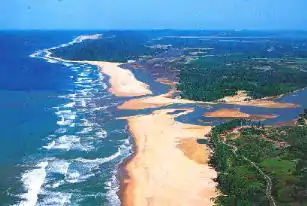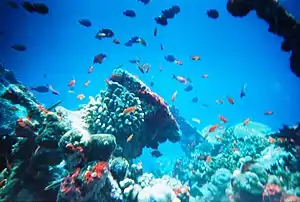Stream pool
A stream pool, in hydrology, is a stretch of a river or stream in which the water depth is above average and the water velocity is below average.[1]

Formation
A stream pool may be bedded with sediment or armoured with gravel, and in some cases the pool formations may have been formed as basins in exposed bedrock formations. Plunge pools, or plunge basins, are stream pools formed by the action of waterfalls. Pools are often formed on the outside of a bend in a meandering river. [2]
Dynamics
The depth and lack of water velocity often leads to stratification in stream pools, especially in warmer regions. In warm arid regions of the Western United States, surface waters were found to be 3-9°C higher than those at the bottom[3]
Habitat
This portion of a stream often provides a specialized aquatic ecosystem habitat for organisms that have difficulty feeding or navigating in swifter reaches of the stream or in seasonally warmer water. Such pools can be important for fish habitat, especially where many streams reach high summer temperatures and very low-flow dry season characteristics. In warm and arid regions, the stratification of stream pools provide cooler water for fish that prefer low water temperatures such as the redband trout (Oncorhynchus mykiss) in the Western United States.[4] Mosquito larvae, which prefer still and often stagnant water, can be found in stream pools due to the low water velocity.[5]
See also
Notes
- Matthew Chasse, Riffle characteristics in stream investigations Archived 2007-11-01 at the Wayback Machine
- http://mostreamteam.org/assets/habitat.pdf
- Nielsen, Jennifer L.; Lisle, Thomas E.; Ozaki, Vicki (July 1994). "Thermally Stratified Pools and Their Use by Steelhead in Northern California Streams". Transactions of the American Fisheries Society. 123 (4): 613–626. doi:10.1577/1548-8659(1994)123<0613:tspatu>2.3.co;2. ISSN 0002-8487.
- tate, kenneth W.; lancaster, donald L.; lile, david. F. (January 2007). "Assessment of thermal stratification within stream pools as a mechanism to provide refugia for native trout in hot, arid rangelands". Environmental Monitoring and Assessment. 124 (1–3): 289–300. doi:10.1007/s10661-006-9226-5. ISSN 0167-6369. PMID 16897516. S2CID 21301944.
- Anbalagan, S.; Arunprasanna, V.; Kannan, M.; Dinakaran, S.; Krishnan, M. (1 December 2015). "Spatio-temporal dynamics of mosquitoes in stream pools of a biosphere reserve of Southern Western Ghats, India". Acta Tropica. 152: 228–236. doi:10.1016/j.actatropica.2015.09.024. PMID 26434940.


